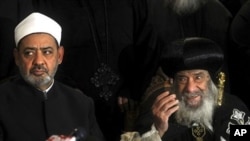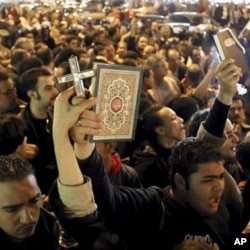Angry Coptic Christians pelted a vehicle carrying Egypt's top Muslim religious leaders shortly after they met with Coptic leader Pope Shenouda III. Mourners also gathered for mass inside the All Saints Coptic church in Alexandria to grieve for the victims of an explosion outside the church early Saturday.
Egypt's top religious leaders met in a frantic attempt to prevent further sectarian violence, following an explosion Saturday outside a church in the port city of Alexandria.
Eyewitnesses say tempers flared after the meeting when an angry crowd of Coptic men pelted a vehicle carrying top Muslim leaders. Reports say Egypt's grand mufti and the Sheikh of al Azhar were not hurt. A spokesman for the mufti indicated that he "understood the anger" of the crowd.
A group of old women in black wailed and cried as they left a mass to mourn loved ones killed in the blast outside the All Saints Coptic church. Egyptian TV showed workers cleaning blood stains and sandblasting the church to remove traces of Saturday's explosion.
After the mass, a priest at the church, Father Maqar Fawzy, tried to put a damper on the angry pulse of worshipers and those outside the church.
He says that all of us are children of Adam, and we are all brothers, so we should have no hostility among brothers, even if my brother is an atheist. No man, he repeats, should have hostility towards his brother.
In the Egyptian capital Cairo and in Alexandria political and religious leaders worked desperately to try to put a lid on escalating tensions between Christians and Muslims. Sheikh Ahmed Tayeb of Egypt's venerable Islamic institution al-Azhar offered an opinion.
He suggests the idea of a kind of family dialogue, including Christian and Muslim leaders, be put in place, in order to help everyone resolve problems among themselves.
Egyptian political leaders also met at the headquarters of the opposition Wafd Party to discuss tensions some fear could lead to bitter sectarian clashes. Wafd leader Sayyid al Badawi says people and politicians must work together to prevent violence.
He says participants agree on the need to have a political discussion, along with a civilian discussion, that will send a clear message to the Egyptian people that we are all made from the same cloth, we are one people and we are all being targeted by recent events.
Demonstrators in Cairo overnight chanted slogans in favor of national unity as police looked on. But that demonstration was matched by the gathering in front of the headquarters of Coptic Patriarch Shenouda III, as young men called for the government to do more to protect churches.
In Rome, Pope Benedict condemned violence against Christians, which many blame on al-Qaida militants in Egypt and Iraq. He said it offends God and the whole of humanity.
The pope said, "Religious freedom is an essential element of a state of law, which cannot be denied."

















